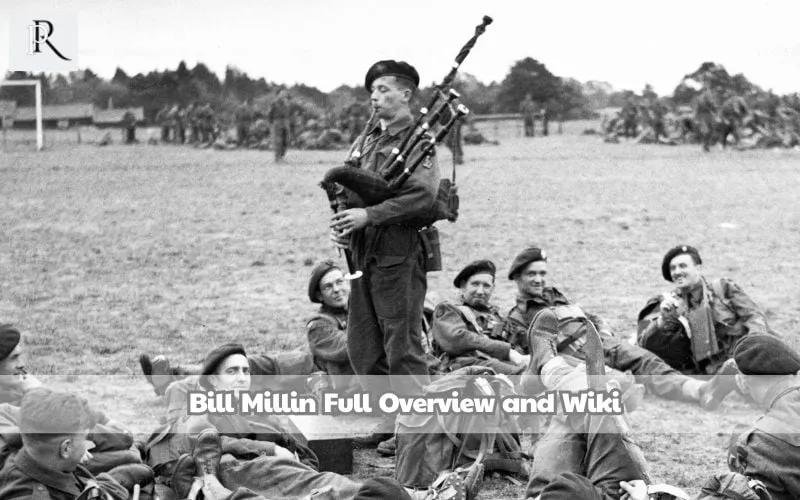Bill Millin, often remembered as the brave flute player of D-Day, left a legacy far beyond the battlefield. What were Bill Millin net worth? Let Da Nang Polytechnic dive into the financial and historical impact of this iconic figure.
Quick information
| TRUTH | DETAIL |
| Real name | William Mills |
| Popular name | Piper Bill |
| Sex | male |
| Date of birth | July 14, 1922 |
| Die | August 17, 2010, Torbay, UK |
| Age at death | 88 years old |
| Parents | Father is of Scottish origin |
| Siblings | do not apply |
| Place of birth | Regina, Saskatchewan, Canada |
| Nationality | brother |
| Nation | Scottish descent |
| Education | do not apply |
| Marital status | Married |
| Sexual orientation | Straight |
| Wife/Wife/husband | Margaret Millin (née Dowdel) |
| Children | John Miller |
| Dating | do not apply |
| Net worth at death | do not apply |
| Origin of wealth | do not apply |
| Height | do not apply |
What is Bill Millin’s net worth in 2024?

Discussing Bill Millin’s net worth in 2024 seems out of place since he passed away in 2010.
As no specific financial data on Millin’s wealth is publicly available, comparisons can be made with famous UK musicians such as Vera Lynn or Cyril Ornadel also becomes challenging.
Unlike these groundbreaking British musicians, Millin did not have a musical career that typically generated significant royalties or widespread commercial success.
His fame and importance lie in his role in World War II and not in his ability to typically yield a quantifiable net worth. So, estimating or comparing his financial status to those with commercial music careers is speculative at best.
Complete overview of Bill Millin and Wiki

Early life and background
William Bill Millin, better known as Piper Bill, was born on July 14, 1922 in Regina, Saskatchewan.
The son of a Scottish father, he moved back to Glasgow at the age of three, where he spent most of his childhood.
Bill’s connection to his heritage deepened as he played in the pipe bands of the Highland Light Infantry and Her Majesty’s Cameron Highlanders.
Military career and D-Day
Bill Millin’s most notable contribution to history was during World War II, specifically the D-Day landings on June 6, 1944.
Serving under Lord Lovat, Millin defied direct military orders prohibiting the use of bagpipes in battle because they attracted enemy fire. Instead, he played the bagpipes as he stormed the beaches of Normandy, a daring act of courage and defiance.
His melodies, of which there are Plateau, Road to the archipelagoAnd All the green hats crossed the borderacting as a morale booster for his soldiers.
Life and legacy after the war
After the war, Millin continued to live a life marked by his dedication to Scottish culture and military history. He eventually moved to Dawlish, where he worked as a psychiatric nurse and became an active member of the local community.
His final years were filled with trips back to Normandy for commemorative events, for which he was awarded Légion d’honneur in 2009 for his bravery.
Millin’s personal items, such as bagpipes and uniforms, are displayed in several museums, including the. Dawlish Museum and Pegasus Bridge Museum.
These artifacts continue to attract those interested in his story and the broader history of the D-Day landings.
Personal life and death
Millin is married to Margaret Millerwith whom he shares a son, John Miller. He retired to the town of Dawlish in Devon, where he died on 17 August 2010.
Cultural influence
His bravery and unique story have been honored in various forms, including a life-sized statue in Colleville-Montgomery, near Sword Beach, which was unveiled in 2013.
His story was also captured in the film The longest daywhere his role on D-Day was showcased, making his indelible mark on history.
Additionally, his life and actions have inspired both musicians and filmmakers, ensuring that his legacy as the D-Day Piper continues to resonate echoes through many generations.
Social media accounts
Instagram: Not applicable
Twitter: Not applicable
Facebook: Not applicable
All about Bill Millin Latest News 2024
There is no information about him in 2024 due to his death.
Frequently asked questions about Bill Millin

Who is Bill Millin?
He was a Scottish bagpiper during World War II who famously played the bagpipes during the D-Day landings at Sword Beach, Normandy, despite intense enemy fire.
What tunes did Millin play on D-Day?
Millin played several tunes included Plateau, Road to the archipelagoAnd after that, Green hat on the border as he marched across the Pegasus Bridge.
What was the reaction of soldiers and Germans to his pipeline?
The Allied soldiers were said to have been elated, and even some German prisoners later expressed that they did not shoot him because they thought he had gone mad.
What happened to his bagpipes?
Millin’s original D-Day bagpipes are on display at the Dawlish Museum in Devon, while a second set used later in the campaign is at the Pegasus Bridge Museum in France.
How was Millin commemorated?
A bronze statue of Bill Millin was unveiled in 2013 at Colleville-Montgomery near Sword Beach in Normandy.
Does Bill Millin have children?
Yes, he has a son.
What did he do after the war?
After the war, Millin became a registered psychiatric nurse in Glasgow.
Has he been mentioned in popular culture?
Yes, his actions on D-Day were depicted in the 1962 film The longest dayand he has been mentioned in songs by bands such as The Real McKenzies.
When did Bill Millin die?
He died on 17 August 2010 at a hospital in Torbay, Devon
Did he receive any awards for his bravery?
In June 2009, France awarded him the Légion d’Honneur for his courage during the Normandy landings.
Conclusion
Bill Millin’s life was marked by his courage and his stirring bagpipes, leaving behind a rich legacy that goes beyond monetary value. Discover more about his life and impact at Da Nang Polytechnic.com.
Categories: Musician
Source: dut.edu.vn





